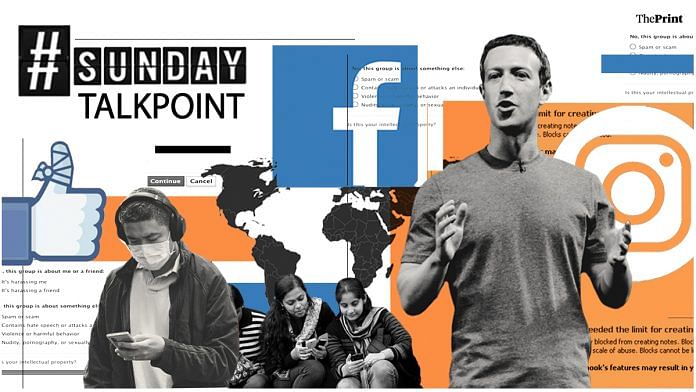Mark Zuckerberg led-Facebook has announced a new oversight board for content moderation. Hailed as the Facebook ‘Supreme Court’, the board will have 20 members from 27 countries, including former Danish PM Helle Thorning-Schmidt, Nobel laureate Tawakkol Karman and National Law University Bengaluru V-C Sudhir Krishnaswamy. The board has the right to overturn decisions taken by Zuckerberg on content allowed on Facebook and Instagram. Facebook’s content moderation strategy has been criticised for years.
ThePrint asks: Will the Facebook ‘Supreme Court’ make FB and Instagram a safer place?
As far as routine content moderation goes, Supreme Court unlikely to make Facebook a safer place
 Rohan Seth
Rohan Seth
Policy analyst, The Takshashila Institution
It is hard to see Facebook, Instagram, and WhatsApp being safer because of this new ‘Supreme Court’. New members of the board have committed to an average of 15 hours a month to the job, which is to moderate what stays up for a user base of nearly 3 billion people.
Even if the board members were working full time, by any standard, the sheer number of cases will still lead to a lot of pendency. Given the current commitment, it only makes sense for the board to tackle the most high-profile cases. Even then, it will end up neglecting more routine cases for content moderation. [Zuckerberg says they are].
It is unlikely that Facebook will defy judgments the body makes anyway (unless they try to mandate something drastic like shutting down the newsfeed). Because why else would they appoint a Supreme Court in the first place?
It may be early to say how successful the board is going to be. But as far as routine instances of content moderation go, there is little evidence to suggest that this will make any platform a safer place.
Even if the ‘Supreme Court’ of Facebook rules against a post, so what? There are no fines or ‘Facebook Jail’
 Regina Mihindukulasuriya
Regina Mihindukulasuriya
Senior Correspondent, ThePrint
The word ‘bakwas’ comes to mind after reading about Facebook’s very own ‘Supreme Court’.
The oversight panel set up and funded by Facebook (to the tune of $130 million) is only going to consider problematic content after they become problematic, not before. Even if the oversight panel rules against a post of yours, so what? There’s no serious penalty involved – you don’t pay any fines, and you don’t end up in a ‘Facebook Jail’.
There is no reason to think FB and Instagram will become safer just because Facebook set up a panel of members, who are basically glorified content moderators.
Facebook has set up other resources in the past like a ‘Bullying Prevention Hub’ – Guess where a lot of bullying, slut-shaming and sextortion happens? (Hint: it’s Instagram).
However, I wish Facebook’s new Supreme Court members all the best; their work will be cut out for them – and that includes balancing someone’s freedom of speech with someone else’s right to not be humiliated while not bowing down to corporate demands of the tech giant.
And after setting up this panel, Facebook can also shift the blame to the panel — if a user doesn’t like the decision, Facebook can say, ‘We had nothing to do with your post being removed.’ This could help Facebook not upset public figures and politicians if their posts are taken down.
Facebook’s new oversight board is a better idea than most of its previous ones, such as using AI to moderate content
 Apoorva Mandhani
Apoorva Mandhani
Principal Correspondent, ThePrint
According to me, the Facebook ‘Supreme Court’ needs to be seen as what it is: an experiment in social media self-regulation and a significant one at that.
On the face of it, the board does have several attributes of what an independent body should look like— fixed terms, funding of the board’s operations by an independent trust, which cannot be revoked, maximum number of terms that a board member can serve, no removal of board members by Facebook, and the decisions and recommendations being made public.
Of course, there are some major limitations to this oversight board. For instance, hate speech and misinformation that this board intends to control spreads far and wide because of Facebook’s own algorithmic amplification. So, the board steps in well after the algorithm has done its job to stop any further damage. The board does not have the ability to change Facebook policies.
But then again, the mere presence of the ‘Supreme Court’ does give Facebook the chance to engage with these experts on its content decisions, and at the very least, make even its policy decision vulnerable to not just external, but also internal criticism.
So, I do think that having an oversight board is an improvement. It is also a lot better than some of the other ideas that Facebook has come up with over the past few years, like artificial intelligence monitoring.
It would give a grievance redress mechanism to Facebook and Instagram users, hopefully making them feel safer than they did before. The extent of change, of course, will be visible only with time.
Facebook gets an A for effort. Let’s not forget the ‘Supreme Court’ can overrule Mark Zuckerberg too
 Pia Krishnankutty
Pia Krishnankutty
Journalist, ThePrint
Facebook’s ‘Supreme Court’ is going to run into the same problem as an ethics committee or a universal civil court would — it’s a little too idealistic. It’s going to entail a group of members, granted some with esteemed qualifications, to take a call on sensitive issues like hate speech and political advertisements, which come with their own subjective circumstances. That said, Facebook gets an A for effort.
The tech giant has a history of poor transparency and allowing questionable content to slip through the cracks but it often takes these issues on the chin, admits fault and makes efforts to reform.
In March, Facebook, along with others such as Google, Microsoft Corp, Twitter Inc and Reddit pledged to provide accurate information on the Covid-19 pandemic. Facebook was also quick to apologise and restore content following user complaints on legitimate news stories being taken down. So, the intent behind its oversight board for content moderation deserves credit.
The fact that the board can overrule CEO Mark Zuckerberg is significant too because it shows the company is doing some introspection. Who can forget how Zuckerberg was grilled by US Congress in April 2018 over user information and then in October 2019 by lawmakers like Alexandria Ocasio-Cortez for the platform’s reluctance to take down political advertisements. He’s very much been the face of Facebook in these sticky situations and that’s been taken note of too.
Also read: What were you planning to do post-lockdown and how will you spend two more weeks?
By Pia Krishnankutty, journalist at ThePrint




A praiseworthy effort. When it comes to dodgy content, the best filters are with viewers and readers.